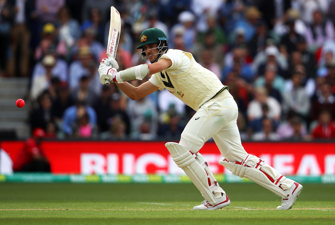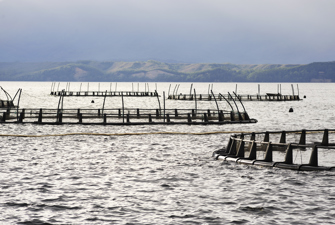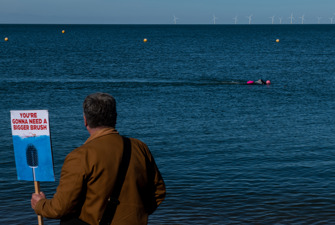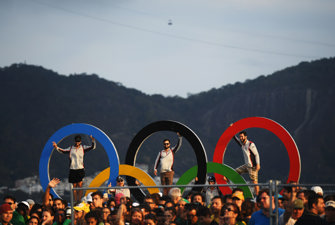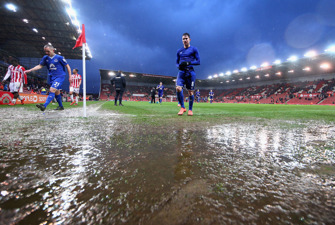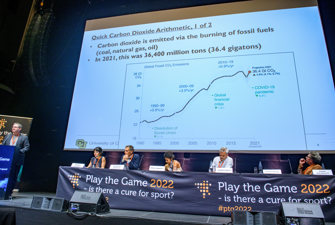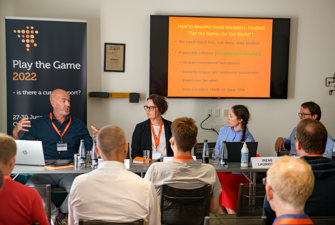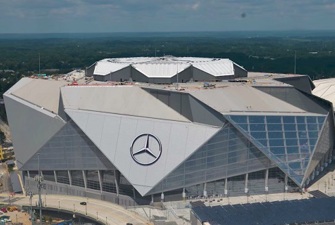Flooding and carbon footprints: Climate change is the next big issue for sport
We are playing against the clock on climate change, argues journalist and academic David Goldblatt. In a new report, he analyses the links between sport and climate change and calls for global sport to offer vital and visionary climate action leadership.
Like every other industry and cultural sector, global sport has been brought to a shuddering halt by the coronavirus pandemic. Yet devastating as this has been, something even more problematic is waiting in the wings for the sporting circus.
Climate change is touching every aspect of human life and global sport is no exception: in 2019, the Rugby World Cup was disrupted by unprecedented pacific typhoons; in early 2020, the Australian Tennis Open was disrupted by the smoke blowing in from the country’s devastating bush fires. The Tokyo 2020 Olympics were forced to move long distance running events north of the capital as the city’s sweltering summer weather now makes them impossible to run.
Coronavirus is not climate change, but there are a number of clear lessons from the current crisis: take the science seriously and assume the worst-case scenario can happen; act now not later, and act radically. If sport moved on this agenda, what kind of changes would it make?
In Playing Against the Clock: Global Sport, the Climate Emergency and the Case For Rapid Change, jointly published by the Rapid Transition Alliance and Play the Game, I begin to explore that question.
First, I examinethe many ways in which climate change is already taking its toll on global sport, and the scale of the risks and difficulties ahead. Needless to say, it’s not looking good: climatological and economic demise for winter sports awaits; heatwaves and heat strokes for players and public alike; extreme weather that floods stadiums and grassroots playing fields; sea level rises that will sweep away golf links and inundate football grounds .
Using mapping technology and mainstream climate change and sea level rise models, I found that Bordeaux’s Matmut Atlantique stadium will, by 2050, be completely flooded on an annual basis, while Werder Bremen’s Weserstadion can expect annual partial floods.
In the United States, the NFL’s Jacksonville Jaguars and their TIAA Bank Field, and the NBA’s Miami Heat and their American Airlines Arena, can expect the same. The New York Giants & New York Jets’ MetLife Stadium and the New York Mets’ Citi Arena will be completely flooded every year.
However, this is nothing compared to the fate awaiting the football stadiums of England. Of the 92 league teams in England, 23, almost one in four, can expect partial or total annual flooding of their stadiums by 2050, including Southampton’s St Marys, Norwich’s Carrow Road, Chelsea’s Stamford Bridge and West Ham’s Olympic Stadium.
The IOC’s carbon footprint is close to that of Barbados
Sport is not just a victim of climate change, however, but an important contributor too. The IOC has a carbon footprint close to that of Barbados, global football’s is even larger. Sporting events are responsible for massive levels of aviation, carbon heavy stadium construction, and mountains of unrecycled garbage, all making a significant contribution to the catastrophe now engulfing us.
If the sports world is to make its own contribution to climate change action, then it needs to acknowledge its own role in creating the problem and radically reduce its carbon footprint, and thus it needs to know how much carbon it is actually producing. No one currently knows, and the research that has been done on different sporting events and institutions is very patchy.
I work with what is available and offer my best estimates of global sport’s carbon emissions, which, if the order of magnitude I have calculated is correct, make sport the equivalent of a nations as large and populous as Angola or Tunisia, and that is at the low end of estimates.
Third, building on Play the Games work on global sport’s governance, I survey the state of environmental policy in global sport, and while acknowledging the best and most innovative practice, it is for the most part a grim picture of inaction.
Ways to a carbon zero world of sport
Finally, I suggest some radical reforms for the rapid decarbonisation of world sport. For example:
- All global sporting federations and their national members, and all professionals sports leagues and tours need to sign the UN Sport for Climate Action Framework and commit, within one year of signing, to draw up and publish a comprehensive ten year plan that will ensure that their own operations and that of their sport, including spectator travel, are carbon zero.
- After 2030, any global sports events or tours that are not carbon zero should be cancelled or postponed until they are. Sports federations that are not carbon zero should be excluded from the Olympics: national federations that have not made sufficient progress could be excluded from international competition by their sports federations.
- The leading professional and commercial tours and leagues should do the same, and membership of that tour or that league should become dependent on clubs and franchises doing the same as well. Progress on carbon reduction could be part of the annual audit that clubs undergo and a precondition of their participation.
- It goes without saying that global sport needs to wean itself of petro-chemical and aviation sponsorship as soon as possible.
We are already deep into extra time. According to the IPCC, if we are to mitigate the worst aspects of climate change then we need massive carbon reductions in the next decade, and global sport can offer vital and visionary climate action leadership.
Sport may be just big enough to register, in terms of carbon emissions, as a small nation state, or a single mega city, but its own efforts are just a fraction of a percentage point of the world total. Yet few human practices offer such an extraordinarily large, global, and socially diverse constituency as those playing and following sport. Making a carbon zero world the common-sense priority of the sports world would make a huge contribution to making it the common-sense priority of all politics.
Sport, from the street to the stadium, generates hope: that hard work yields the possibility of development; that no cause is lost until the game is actually at an end; that the past tells us miraculous recoveries, turnovers and rallies are possible; that human beings, individually and collectively, have the heart and the wit, when the time comes, to make it happen. That is a precious set of cultural treasures to hold in trust for the world. If global sport is ready to adopt and pursue real radical change in the field of climate action, it might be able to offer them, in all good faith, to humanity … and then you just never know.



